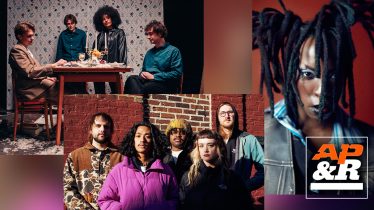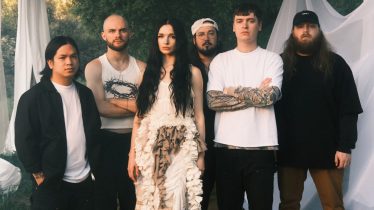Festivals For The Rest Of Us: An Industry Roundtable About Festival Life, Part Two
(For part one of this story, go here!)
With winter almost over, the spring and summer festival circuit is beginning to roll into action. For many music fans, spending a day (or two, or three) catching a slew of their favorite bands is an experience they anticipate each year. But how do these festivals even end up happening? And what exactly goes into planning them? AP chatted with producers from some of your favorite festivals to see what it takes to make these events come off without a hitch.
The Festivals:
Bled Fest
When/Where: May 26, 2012, in Howell, MI
What: A six-stage indoor festival held at a community center
Notable acts: The Early November, As Cities Burn, Comeback Kid
Price: TBA
South By So What?!
When/Where: March 17, 2012, in Grand Prairie, TX (in the Dallas metro area)
What: A three-stage outdoor festival held at a baseball stadium
Notable acts: Asking Alexandria, We Came As Romans, Motion City Soundtrack
Price: $42.25
Vans Warped Tour
When/Where: June 16-August 5, various venues
What: A multi-stage outdoor festival tour
Notable acts: New Found Glory, Sleeping With Sirens, Transit, Mayday Parade
Price: TBA
Rock On The Range
When/Where: May 18-20, 2012, in Columbus, OH
What: A three-stage outdoor weekend festival held at a soccer stadium
Notable acts: Mastodon, Attack Attack!, Falling In Reverse
Price: $151 for a weekend pass
The Panelists:
Mike Ziemer, CEO/Founder of Third String Productions; South By So What?! Producer
Nate Dorough, Co-Owner/Talent Buyer of Fusion Shows; Bled Fest Talent Buyer/Producer
Kevin Lyman, Founder/Producer of Vans Warped Tour
Gary Spivak, Co-President of Right Arm Entertainment; co-producer of Rock On The Range.
Joe Litvag, Senior Vice President of AEG Live; Co-Producer of Rock On The Range
What is the band selection process like?
[Nate Dorough, Bled Fest]
Basically, I put out a submission email to all the booking agents that I work with saying, “Hey, now accepting submissions for Bled Fest,” and they send back who’s available. That’s for the national buying. We look over it and make offers on the things we’re into and pass on the things that we’re not. On the local level, there’s 25 to 30 local artists that play each year—and for that, we open a specific Gmail account each year and we allow local bands to submit. The fun part—and the difficult part, I suppose—is tearing it down and getting it down to a list that we can fit on a schedule.
[Mike Ziemer, South By So What?!]
For the most part I start building my show around the first major bands that are submitted—like this year, one of the first things submitted to me was the Asking Alexandria package, the We Came As Romans package and the For Today package—all in the same week. I was like, “Alright, we’re definitely going to have the heavy stage and have all these bands.”
I send emails to all the agents I have info on and I say, “Hey, we’re in the planning stages of South By So What?! and this is the weekend we plan on doing it. Let us know who’s available.” It’s crazy, because it’s gone from getting a few responses [when we first started], to this year, I got over 500 responses and I’m still getting them. It’s one big headache until it all gets figured out. It’s becoming a thing where bands want to play it—and that’s when I realized it’s becoming successful.
[Kevin Lyman, Vans Warped Tour]
It’s [been] fun the last two years for me, as I’ve taken the lineup back to a very eclectic space. I think when it rounds out, everyone will go, “Oh,” and all the banter online about how the lineup is this or that or this [will stop]. I’m going over 3,000 submissions to find a lineup. You don’t hit it 100% right all the time, but I think we must be doing something right if we’re still around. According to the kids online, I haven’t booked a good band since 1996.
[Gary Spivak, Rock On The Range]
We see where we can go on the left, where we can go on the right and right down the middle to create this big, jambalaya of rock so we can make sure we are the rock festival. The process is with the partners—it’s all a collective decision.
How do you communicate festival details and potential problems with bands, to make sure everyone is on the same page?
[Nate Dorough, Bled Fest]
Seven million emails. I think one of my biggest strengths is in organization and forethought. Since we’ve done this so many times, we know what can go wrong, what goes right, what’s easy to know, what’s confusing and all those kind of things. We address every single possible outcome in a pretty detailed advance to the bands.
This is a school building, so it’s rough to go up to somebody like Every Time I Die, who headlined last year and is a band that you know loves to party, and tell them, “Look, I love you guys and have had you on multiple shows and I would fill your rider request for beer and everything else, but you’re on a school property—I need you to be on your best behavior today.” It’s weird to tell that to headlining acts that have the possibility to sell out thousand-capacity rooms.
[Mike Ziemer, South By So What?!]
We’ll have our own special advance we send out a few or two weeks out that’s like, “Okay, here’s a list of details, here’s when you play, here’s who you need to meet with to get your meal tickets and all that.” I have a day-of-show person that will meet with the bands and give them their passes and those tickets and take them to where they set their stuff.
It’s a big process of bugging tour managers, which they appreciate, because sometimes they’ll show up to venues and won’t know anything because promoters won’t communicate. Most of the time, my production coordinator will hand them a map of the venue that highlights everywhere they need to go and phone numbers for every possible contact they would need.
[Kevin Lyman, Vans Warped Tour]
We have a great staff. They’re constantly working with the labels, the managers on marketing—everything you can possibly do to be ready to go when you hit the road. That is what makes a successful festival—being prepared to go on the road. More preparation makes it easy when you get out there.
[Gary Spivak, Rock On The Range]
When we’re talking to a band, we definitely are upfront about the slot and day we have in mind, who they’re going to be with. All the bands have been, in general, really great to work with. They know this is Rock On The Range—it has great value. It’s not so much the performances as the priority to these bands, but what surrounds Rock On The Range.
What kind of amenities do you provide for the bands?
[Nate Dorough, Bled Fest]
We use a lot of local organizations for catering. We try to provide a lot of bang for our buck. Last year, we used a local barbecue company that used all farm-raised and organic meats and things like that, so that was cool to be able to offer. We’re not into schmoozing, I guess. It’s a very punk ethic: We make sure everybody is fed and taken care of, but we’re definitely not out there trying to provide filet mignon for anybody. We’d rather have a barbecue-pulled-pork burrito for each band member. We’re not catering to the Barbra Streisands of the world.
[Mike Ziemer, South By So What?!]
Our larger bands have their own dressing rooms, but all the bands have an artist tent area. We do catering, and they have their own private areas. For this show, for instance, there is going to be a six-foot gate that goes from the back stage area to the main stages to the side stage, so technically if an artist never wanted to walk by a fan, they could go through the gate, go on stage, play their show, walk back, go to their dressing room, go to the artist tent, hang out, go to the parking lot, sit on their butts—they could do anything without having to interact with fans.
The coolest thing we’ve known about our festival, though—bands don’t do that. They don’t hang out on their butts. They go and interact, walking around telling people, “Hey, we play this stage at this time.” You’ll see a lot of bands walking around with signs. So even though we give them the ability to have privacy, they really just take advantage of knowing how many kids are at the show.
[Kevin Lyman, Vans Warped Tour]
You get your meals—I think the food on Warped Tour is known as pretty good. I think feeding them well keeps them healthy. They get a case of beer, a case of water, and all the Monster Energy Drink they want. Pretty simple—we keep it very basic and simple, from the big bands to the smaller bands.
[Gary Spivak, Rock On The Range]
Beyond the typical catering, we have a backstage lounge and air-conditioned lounge that has games and certain guitar and drum brands displaying products along with a full bar and then the press and radio rows. A lot of the bands you’ll see on the side of the stage watching other bands and stuff—it’s real cool. Very rarely do we have a band that pulls up, does their show, pulls out—they tend to spend the whole day with us.
When the festival actually happens, what goes on? Can you run me through a day’s activities from the production side?
[Nate Dorough, Bled Fest]
I can look out my front window and see the school building, so I pretty much spend the whole week there beforehand working on various things. The whole crew is there Friday night to set up, arranging staging that we do need—which is minimal—setting up sound systems, lights, hanging promotional materials around the venue and things like that. Then we sleep for a couple hours and come back first thing in the morning.
We get there at 7 a.m. Everybody has a checklist, and you walk through your responsibilities. You just have to have it all laid out so there’s no gray area when a security guard says, “Well, I tried to throw him out, but this other guy said he doesn’t need to be thrown out.” I’m just trying to make everything as black-and-white as possible, and that’s all from working through it before the show. If the day of show is stressful—this is my motto around Bled Fest time—you didn’t do your job because it shouldn’t be. The day of show should just happen how it’s supposed to happen, because you spent six months planning.
[Mike Ziemer, South By So What?!]
The day before we do our full load-in, so stages, sound—everything—is all checked and ready. I show up as the sun’s rising and meet with everyone to make sure everything is going well. I kind of know where I’m needed. I have my own production office, but I think last year I spent maybe a few minutes there.
This year, going back to being in charge of everything and making every decision like when we were at the Plano Centre, it’s a little different. I’ll have to sit there and be on the walkie-talkie with my sound guy, with my production person, with my runner, with the ticket guy—there’s people helping with everything in every aspect, but I have to oversee every area and be the middle man between certain people and make sure everyone from the band to the sound guy to the kids to the parents are happy.
[Kevin Lyman, Vans Warped Tour]
When we roll in, we roll in with all the stages, all the sound, all the generators—everything. We are a moving city. A lot of people think we have two sets of things, but we don’t. We get nineteen trucks unloaded and set up in four hours, and we can load it up in two hours and be on the road to get out of there. It’s a machine—I think it kind of blows people away. It’s the hardest tour you’d ever work on.
[Joe Litvag, Rock On The Range]
We’re there setting up for the festival probably four or five days prior to the first day of the festival. Every day we have a detailed production schedule, and every day there are certain things on the agenda of things to do that day.
Typically on the first day of the festival—being Saturday—each of the production people have their specific place of focus. Our production manager will oversee the main stage and make sure all the artists have what they need and that we’re on schedule. The same thing goes for our managers on the second and third stage. The venue operation folks look after the security personnel and the rest of the staffing side. We have stage managers to oversee stagehands, and I am always there just to put out little fires.
What do you want people to know about your festival?
[Nate Dorough, Bled Fest]
I think it’s important people know festivals like this don’t have to cost as much as they do. We take pride in the fact that our ticket price is ridiculously lower than anything else that is comparable throughout the area. We try to keep greed out of the equation. We want people to have a good time and bands and fans to exist in a space that is mutually beneficial to them and cut out all the other bull crap.
If that means we don’t have corporate sponsors, we don’t charge service fees for the tickets, if bands don’t get filet mignon—but do get a burrito—then I think, in the end, it’s mutually beneficial for everyone involved. That’s what we strive for every single year. If we can walk away having felt like we provided $100 or $300 worth of fun, then I think we can pat ourselves on the back and call it a good day.
[Mike Ziemer, South By So What?!]
The biggest message that I try to get across is how big of a value the festival is, because people will complain about a ticket price without understanding that if we didn’t do this festival, all these tours would come to town and you’d pay $25 for Asking Alexandria, $20 for the For Today Tour, $20 for the We Came As Romans tour, etc. We pack in 60 bands, we give you three stages, we give you an opportunity with staggered set times so you can see parts of every set you want to see. We make sure there is food, water, that the price is affordable, there’s VIP options, there’s [disability accommodations]—everything you could possibly need, all for a price we think is really fair.
We’re all concert and music fans that put this on, and we want to make it an experience we would want. We try to make everything—from a general-admission ticket, a T-shirt, a poster, a VIP pass to the meet-and-greet or any kind of experience we offer within the show—something that we, as a fan, would want if it were our favorite band.
[Kevin Lyman, Vans Warped Tour]
Warped Tour is a lot of people that give a crap, to be honest. From the kids that set up the merch booths to the nonprofits that are out there, you get to work with a lot of people who really give a crap during the summer time. Everyone is out there for a likeminded goal of trying to put on the best show and put out their best efforts in a very tight schedule.
[Gary Spivak, Rock On The Range]
We just want people to know that we pride ourselves on being the rock ’n’ roll festival of North America. There are a lot of festivals, but we believe Rock On The Range is the rock ’n’ roll festival, and we want to continue to provide that type of festival year after year. alt
(For part one of this story, go here!)








